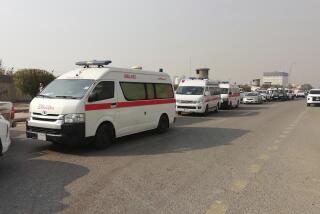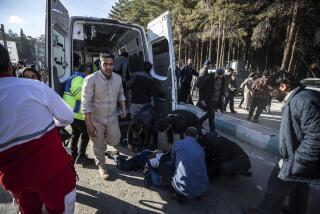Insurgents Kill U.S. and Iraqi Troops
- Share via
BAGHDAD — Four U.S. troops, several Iraqi national guardsmen and a popular Baghdad police commander have been killed since Monday night as militants continued to unleash a string of attacks across the nation.
Mourners at the funeral of the neighborhood police station chief were dealt a further blow when militants opened fire on the crowd, injuring five people.
In the last week, violence has left at least 130 people dead, mostly Iraqi civilians. The increasing bloodshed underscored the security challenge facing the interim government of Prime Minister Iyad Allawi, who returned to Iraq on Tuesday after a 10-day trip aimed at enlisting help from other Arab countries.
Hours before Allawi’s return, a man in an explosives-packed car plowed into a checkpoint manned by members of Iraq’s national guard outside the city of Baqubah, north of Baghdad. The driver tried to veer into a U.S. military convoy but exploded his car at the guard post, U.S. officials said.
Reports put the number of dead at four to six. Six other people were injured.
“The explosion tore apart the bodies of the [guards],” said Mohammed Duleimi, the checkpoint commander. “Some of the bodies were carried out in plastic bags.”
The deaths added to the mourning in Baqubah, where a suicide bomber killed at least 70 people outside a police station last week. Many of the dead were young men who had lined up to apply for jobs.
Duleimi called for more resources for local law enforcement officials. “We are in bad need of weapons and equipment,” he said.
The U.S. military said a roadside bomb on the outskirts of Baghdad killed two soldiers and wounded two others late Monday. A Marine died Tuesday after a mortar round hit his observation post north of Fallouja, the military said.
U.S. officials said a Marine was killed in what the military called a “non-hostile” shooting near the city of Najaf. No further details on the U.S. military deaths were immediately available.
Najaf was the scene of fighting Monday between U.S. troops and militants loyal to anti-American cleric Muqtada Sadr. Associated Press reported Tuesday that Sadr’s followers had kidnapped 18 Iraqi police officers as leverage to force authorities to release comrades who had been detained.
The police commander killed Tuesday, Col. Moayed Mahmoud Bashar Janabi, was driving with two bodyguards through the upscale Mansour neighborhood in west Baghdad when a roadside bomb blew apart their pickup truck. Janabi was killed and his guards were injured.
Janabi had commanded the Mamoun police station for less than a year and was well-liked by his officers, who recalled how he collected money for employees who hadn’t been paid for two months.
The slaying left some in his ranks angry and fearful. “We are working for the interest of the people. We are against thieves, looters and killers,” said a warrant officer who asked not to be identified. “What have we done to be targeted in this way?”
A contingent of police officers and station employees attended Janabi’s funeral in central Baghdad later in the day. But after Janabi was buried, attackers opened fire on mourners leaving the ceremony, witnesses said.
An official at the hospital where Janabi had died said five people were treated for wounds sustained in the attack. No deaths were reported.
Insurgents also struck at Iraq’s infrastructure by bombing an oil pipeline west of the northern city of Kirkuk. The pipeline runs to the port of Jihan in Turkey, and a source with the Northern Oil Co. said exports to Jihan had been temporarily curtailed.
Meanwhile, the U.S. general formerly in charge of the Abu Ghraib prison near Baghdad, where naked and hooded Iraqi prisoners were abused and sexually humiliated by American guards, told BBC Radio that she was deliberately kept uninformed of the mistreatment of captives.
Brig. Gen. Janis Karpinski said in an interview that a “very reliable witness” had told of “specific measures” taken to ensure that she did not know about the abuse. Karpinski hinted that the cover-up “may have” reached as high as the Pentagon and the White House.
Times staff writer Mark Mazzetti, who is with the U.S. military command at Camp Victory in Baghdad, and special correspondents Raheem Salman and Saif Rasheed in Baghdad and Faris Mahdawi in Baqubah contributed to this report.
More to Read
Sign up for Essential California
The most important California stories and recommendations in your inbox every morning.
You may occasionally receive promotional content from the Los Angeles Times.













